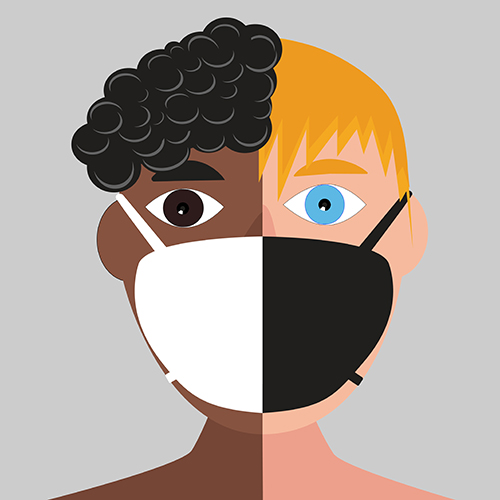Justices rule LGBT people protected from job discrimination
Posted on July 20, 2020
 WASHINGTON (AP) — The (US) Supreme Court ruled Monday that a landmark civil rights law protects gay, lesbian and transgender people from discrimination in employment, a resounding victory for LGBT rights from a conservative court.
WASHINGTON (AP) — The (US) Supreme Court ruled Monday that a landmark civil rights law protects gay, lesbian and transgender people from discrimination in employment, a resounding victory for LGBT rights from a conservative court.
The court decided by a 6-3 vote that a key provision of the Civil Rights Act of 1964 known as Title VII that bars job discrimination because of sex, among other reasons, encompasses bias against LGBT workers.
“An employer who fires an individual for being homosexual or transgender fires that person for traits or actions it would not have questioned in members of a different sex,” Justice Neil Gorsuch wrote for the court. “Sex plays a necessary and undisguisable role in the decision, exactly what Title VII forbids.”
Justices Samuel Alito, Brett Kavanaugh and Clarence Thomas dissented.
“The Court tries to convince readers that it is merely enforcing the terms of the statute, but that is preposterous,” Alito wrote in the dissent. “Even as understood today, the concept of discrimination because of ‘sex’ is different from discrimination because of ‘sexual orientation’ or ‘gender identity.'”
Kavanaugh wrote in a separate dissent that the court was rewriting the law to include gender identity and sexual orientation, a job that belongs to Congress. Still, Kavanaugh said the decision represents an “important victory achieved today by gay and lesbian Americans.”
The outcome is expected to have a big impact for the estimated 8.1 million LGBT workers across the country because most states don’t protect them from workplace discrimination. An estimated 11.3 million LGBT people live in the U.S., according to the Williams Institute at the UCLA law school.
But Monday’s decision is not likely to be the court’s last word on a host of issues revolving around LGBT rights, Gorsuch noted.
Lawsuits are pending over transgender athletes’ participation in school sporting events, and courts also are dealing with cases about sex-segregated bathrooms and locker rooms, a subject that the justices seemed concerned about during arguments in October. Employers who have religious objections to employing LGBT people also might be able to raise those claims in a different case, Gorsuch said.
“But none of these other laws are before us; we have not had the benefit of adversarial testing about the meaning of their terms, and we do not prejudge any such question today,” he wrote.
The cases were the court’s first on LGBT rights since Justice Anthony Kennedy’s retirement and replacement by Kavanaugh. Kennedy was a voice for gay rights and the author of the landmark ruling in 2015 that made same-sex marriage legal throughout the United States. Kavanaugh generally is regarded as more conservative.
The Trump administration had changed course from the Obama administration, which supported LGBT workers in their discrimination claims under Title VII.
During the Obama years, the federal Equal Employment Opportunity Commission had changed its longstanding interpretation of civil rights law to include discrimination against LGBT people. The law prohibits discrimination because of sex, but has no specific protection for sexual orientation or gender identity.
In recent years, some lower courts have held that discrimination against LGBT people is a subset of sex discrimination, and thus prohibited by the federal law.
Efforts by Congress to change the law have so far failed.
Seattle Times, June, 15, 2020, Nation | Nation & World Politics
SEE ALSO:
More Race Relations Articles
Sexual Bias Articles
Mental Health Articles
How Drugs and Alcohol Affect the Brain and Body
WA. Counselor Directory: find a therapist near you
How helpful is this web page to you?
(and how can we can improve this page for you?)
not helpful
very helpful
Other Articles
Racial Inequity of Coronavirus
Teresa and Marvin Bradley can’t say for sure how they got the coronavirus. Maybe Ms. Bradley, a Michigan nurse, brought it from her hospital. Maybe it came from a visiting relative. Maybe it was someth... read more
If Seattle police budget is cut in half...
The Future of Policing: As protesters across the country demand sweeping changes to law enforcement, The Seattle Times begins an examination of what that future could look like and the hurdles ahead. Today,... read more
To understand structural racism, look to our schools.
Education Lab - Local News
Education Lab is a Seattle Times project that spotlights promising approaches to persistent challenges in public education. It is produced in partnership with the Solutions Journalism Network and is funded b... read more
A monstrous breach of the First Amendment
“Congress shall make no law respecting an establishment of religion, or prohibiting the free exercise thereof; or abridging the freedom of speech, or of the press; or the right of people peaceably to a... read more





